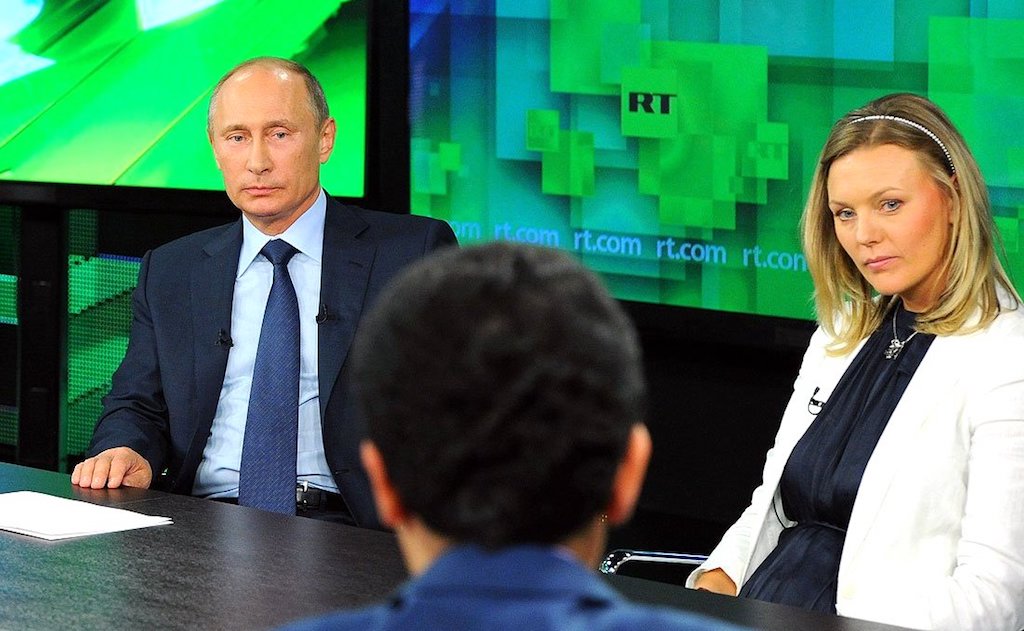How Putin Works to Weaken Faith in the Rule of Law and Our Justice System
In the summer of 2016, a Facebook group called “Secure Borders” began fanning the flames of rumors that a young girl had been raped at knifepoint by Syrian refugees in Twin Falls, Idaho. The group accused government officials, including the prosecutor and judge in the case, of conspiring to protect the immigrant community by covering-up the true nature of the crime.

Published by The Lawfare Institute
in Cooperation With

In the summer of 2016, a Facebook group called “Secure Borders” began fanning the flames of rumors that a young girl had been raped at knifepoint by Syrian refugees in Twin Falls, Idaho. The group accused government officials, including the prosecutor and judge in the case, of conspiring to protect the immigrant community by covering-up the true nature of the crime. Secure Borders attempted to organize a rally, demanding, among other things, that “[a]ll government officials, who are covering up for these criminals, should be fired!” The claims were riddled with falsehoods. There were no Syrian refugees involved, and there was no knife. But because the suspects were minors, privacy laws made it difficult for the court to publish facts that could correct the public narrative.
The “Secure Borders” Facebook group was not the product of outraged Twin Falls residents. It was created by Russian operatives as part of Russia’s ongoing campaign to weaken our institutions of American democracy—in this case, by sowing discord and painting the justice system as an agent of politicians.
As Russia’s desired narrative took hold, images of the judge in the case were shared by a website called “Bare Naked Islam,” stamped with the words “corrupt judge.” Others posted his home address. When the local federal prosecutor issued a public statement warning against the “spread of false information or inflammatory or threatening statements about the perpetrators or the crime itself,” she became the subject of online vitriol, accusing her of attempting to censor the public.
The Defending Democratic Institutions Project at the Center for Strategic and International Studies (CSIS) has studied how Russia continues its attack on democracy by pushing a narrative weakening faith in the rule of law as administered by the justice system in both the United States and Europe. While policymakers on both sides of the Atlantic have made important strides in confronting election manipulation and related attacks—and, increasingly, understand that information warfare is targeting public attitudes beyond elections—they have not yet come to grips with the threat to the justice system specifically and have not taken adequate steps to protect against it.
Efforts to counter information operations more broadly, such as those recommended by a bipartisan group in a CSIS report on “Countering Adversary Attacks on Democratic Institutions,” are a good start. But more focused action is needed to protect the justice system. To advance this goal we have worked with organizations like the American Bar Association, the Federal Judicial Center, the Administrative Office of the Courts, the National Center of State Courts and others to raise awareness among federal and state judges and justices about the ways Russia, and potentially other malicious actors, undermine trust in the courts.
The idea of a system built on the rule of law and justice delivered by a fair and impartial judiciary is a critical pillar of democracy and one of its greatest strengths. To erode confidence in this idea is to erode confidence in the institutions of justice. Mistrust begins to drive a wedge between the government and the governed, undermining a key element of democracies. If the goal of Russia’s leadership is to cheapen the appeal of liberal democracy in the eyes of the Russian population as well as those of Americans and others around the world, targeting the judicial system is an effective strategy.
The justice system may be attacked precisely because it is an effective tool for countering pernicious interference by foreign adversaries, thereby threatening their success. We’ve certainly seen this in Eastern and Central Europe, as described in the October 2016 report by CSIS, “The Kremlin Playbook.” But we also see it in the U.S., where, for example, a steady drumbeat of Russian-affiliated tweets target the Justice Department, the FBI, and Mueller.
To protect the judicial system, the public needs to first understand how Moscow’s information operations attempt to weaken the judiciary.Moscow cultivates rumors and divisive issues endemic to the target country and amplifies them. It exploits restrictions in the legal system, like rules limiting disclosure of information designed to protect the privacy of citizens in court or before a grand jury. And it reinforces its propaganda at the highest levels, as when Russian President Vladimir Putin, after threatening to sue the State Department in a U.S. court, mockingly noted that “[w]e will see how effectively the much-lauded American judicial system works.”
It is no coincidence that cases swarmed (surrounded) by disinformation often involve children. In addition to providing the shock value that makes stories go viral, court cases concerning minors are bound by privacy restrictions. As a result, prosecutors and police cannot comment on the details of an investigation, allowing rumor, innuendo and conspiracy peddlers to fill in the blanks with theories and their own narratives.
Lack of effective public communication is exploited to foster claims of a cover-up, and to paint the courts and prosecutors as tools of politicians or indifferent to justice. Putin himself has used this trick, and not only in the American context. Referring to an Austrian court case, he lamented, “You saw what happens—an immigrant raped a child … The court acquitted him.” In fact, the individual was not acquitted, but ordered to face a new trial in relation to rape charges, while his sexual assault conviction still stands. Similarly, Russian Foreign Minister Sergei Lavrov accused German authorities of a cover up because the prosecutor did not bring charges in a case involving allegations that a young girl had been raped by refugees—allegations authorities had determined were fabricated. This narrative of prosecutors putting refugees ahead of citizens to cover up lax immigration policies was used in Twin Falls.
In addition to Putin’s own statements, Russia’s English-language propaganda outlets, RT and Sputnik routinely produce content that alleges corruption, partisanship, and fundamental unfairness of the justice system. Consider this from an Aug. 24 opinion piece in Sputnik, asserting that prosecutors were setting up Manafort and Cohen to incriminate the President so that his political enemies can impeach him:
This is how the “American Dream” really operates. It's dirty, grim, and brutal, and has very little to do with democracy or rule of law. Forget the emblems of supposed American civility, the white-picket fences, apple pie in bourgeois comfort, old glory fluttering down at the courthouse, and all those other imaginary democratic virtues… In reality, it's not the American Dream, it's the American Scream.
Or this opening from a weekly program on RT called “America’s Lawyer”:
To say that the justice system in the United States is broken would be a gross understatement. Corporations and corrupt politicians have taken control, turning the once impartial judiciary into a tool for the elite to use for their own gain.
Social media also is a key weapon of choice, particularly when divisive issues like immigration bump up against the criminal justice system. The social media storm in Twin Falls was just one example. When a jury in California determined that the shooting of Kate Steinle by an immigrant here illegally had been an accident, tweets of outrage dominated Russian-linked Twitter accounts tracked by a digital forensics site called Hamilton 68. More recently, these social media accounts again erupted around the tragic murder of Mollie Tibbetts by a man alleged to be an undocumented immigrant.
Russian messaging about the justice system does not always support one ideology over another; it is neither entirely right-wing nor left-wing. Instead, disinformation aims to sow discord by incensing individuals on both sides of divisive issues. A recurring theme of the Russian IRA’s Facebook ads was racial inequality—one of the most salient examples of a genuine injustice exploited by Russian disinformation. Ads highlighted the indifference of U.S. courts to police brutality against minorities. At the same time, however, separate ads feigned outrage over alleged attacks against law enforcement officers by black activists. Not stopping there, the IRA sometimes used cross-targeting—for example, setting the targeting parameters for an ad calling for an end to racism, apparently among police, to target police and military profiles exclusively—aiming to foster resentment of real activists.
Having long realized that the most effective disinformation is based on a kernel of truth, Moscow latches on to legitimate criticisms of the justice system. Shows like “America’s Lawyer” and the “Criminal Injustice” segment on Sputnik’s “Loud & Clear” often weave genuine concerns and viable grievances in with misleading narratives. Important causes are hijacked, making Kremlin-linked outlets appear to be the champions of justice reform in the United States while, in reality, their programming is designed to exacerbate grievances and weaken our institutions.
These tactics might imply a false choice between holding the justice system to account for perceived injustices and stymying the Russian efforts to spread mistrust of the judicial system. In fact, increasing transparency and accountability in the courts is essential to defeating the Russian strategy. Russia will use real instances of corruption, unfairness, and bias to discredit the entire institution. Those involved in the justice system must operate in a way that merits public trust.
Russia’s information operations targeting the 2016 election included cyber-enabled tactics like “hack-and-leak.” We should assume Russia will attempt to further its information operations against the justice system by penetrating the courts’ computer networks or judges’ personal email accounts to access and expose unflattering communications, perhaps mixing in fabricated communications; steal sensitive information; alter data such as release orders or even draft decisions; or simply seek to demonstrate that courts can be hacked. Judges have an obligation and responsibility to employ cybersecurity best-practices and improve awareness of this threat in their chambers.
Back in 1983, Dennis Kux, who chaired the Reagan administration’s Active Measures Working Group tasked with countering Soviet propaganda, pointed out that “[t]he best means of rendering the ground less fertile is to ensure that people … are fully aware of attempts to deceive them.” The public needs to be made aware that an adversary is working to exacerbate declining trust in our democratic institutions, including the justice system. Judges and their administrative staffs need to be prepared to respond quickly, and other community voices must be prepared to help set the record straight when misinformation threatens to overwhelm the public discourse.
Members of other branches of government also have an obligation to be aware of Putin’s plot to undermine faith in our institutions, including the justice system. Beyond implementing bi-partisan sanctions against Russia and working to expose Russian activities on social media , public officials must help restore trust by actively living up to their institutional responsibilities and ideals, demonstrating their own commitment to the rule of law and fundamental belief in our system of justice. We all must work to improve our justice system and work to correct the perceived flaws. This has been our constitutional legacy and history.
Russia’s information operations aim to divide Americans by extrapolating instances of judicial shortcomings to the entire judicial system, politicizing the judicial branch, and undermining trust in its ability to make fair, unbiased decisions. A better public understanding of the justice system, how it functions, and why its role is so important will build resilience against this campaign of divisiveness. But we cannot succeed in countering this threat if our leaders are among those feeding it. As former Sen. John McCain warned in February of this year, “If we continue to undermine our own rule of law, we are doing Putin’s job for him.”
Laura Daniels and Sabrina McCubbin contributed to this article while at CSIS.





